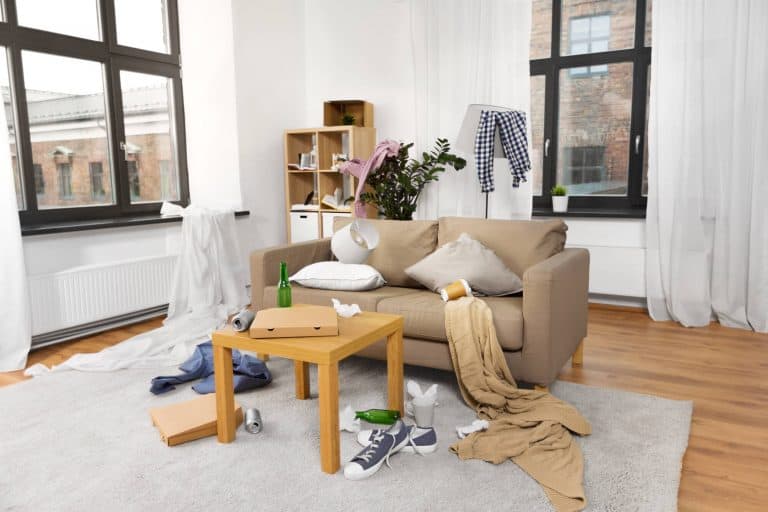How To Find and Keep the Motivation to Declutter
Your home is a mess and you really need to start sorting through it all. You’ve tried, but it’s so stinking hard. Here are some ways to find and keep your motivation to declutter.
What exactly is motivation?
It’s the need or reason for doing something and it can be the key to your success or the reason you fail.
Motivation is directly influenced by the final goal, how much value it represents, and how badly you want it.
If you don’t place a lot of value on an end goal, you’ll struggle to find the motivation to start, continue, and complete it.
Remember that favorite little black dress you bought in your twenties? You probably worked a couple of extra shifts to be able to afford it. That’s motivation!
Here are some ideas for finding and keeping your motivation to declutter.
This post may contain affiliate links. Please see my disclosure policy for details.

1. Define Your WHY
One of the most important but commonly overlooked motivating factors is the Why. Most people make a decision and try to just jump right in.
That works for some, but not most.
Before you start your project, find your Why. It doesn’t matter how big or small your project is, or how big or small the impact will be, there’s always a Why.
I talk a lot about defining your Why in relation to a lot of different topics. There’s a reason for that. It’s important. Knowing Why you want to do something makes it all make sense and motivates you to get it done.
You’re here searching for decluttering motivation, so that means you’ve already decided that you need to declutter, but what made you come to that conclusion?
Some people start decluttering in order to simplify their belongings on their journey to a minimalistic lifestyle. Others declutter because they’re being overtaken by stuff and have no choice. The rest of us fall somewhere in between.
Personally, I usually declutter when stuff starts getting in my way or I have to dig to find what I’m looking for. . . Yes, I’m looking at you, pantry! I call it ‘angry decluttering’.
What about you? What made you decide to declutter?
Once you figure out your Why, write it down. Keep it handy so you can refer to it any time you’re struggling to get started or continue on your decluttering project.
2. Set Goals
Once you know your Why, set goals for your project. Decide and define exactly what you want to accomplish.
Goals are different from your WHY in the sense that your WHY is your overarching reason or purpose, but your goals are specific outcomes and milestones.
For example, if your WHY is to adopt a minimalist lifestyle, then your decluttering goal might be to eliminate any duplicate or unused items and keep only multi-use items that are absolutely necessary.
If your Why is to simply clean up an overstuffed bedroom and get that huge pile of clothes off the floor, maybe your goals should include getting rid of clothes that don’t fit, installing proper storage for the types of clothes that are left, and fitting all of the clothing in the closet.
Once you define your decluttering goals, write them down and keep them handy with your WHY statement.
100 GUILT-FREE ITEMS YOU CAN DECLUTTER TODAY!

Join thousands of VIPs for cleaning, decluttering, and organizing tips sent straight to your inbox. As a welcome gift, we’ll send you these FREE printable lists of Over 100 Easy Items You Can Declutter Today!
3. Create a Plan
Yes, a plan. Creating a plan might seem like extra work, but it keeps you on task and moving forward.
It provides a starting and ending point along with progress checkpoints to help you stay motivated.
Benjamin Franklin once said, ‘a failure to plan, is a plan to fail‘, and he couldn’t be more right! If you don’t have a plan, you can be easily distracted.
Create a decluttering plan to help you stay on task. It can help you conquer common roadblocks and avoid typical mistakes.
You don’t have to go into tons of detail or make it super complicated, but at least create a simple outline.
Let’s say you’re goal is to declutter your kitchen. Your plan might include decluttering your counters, cabinets, drawers, pantry, and refrigerator.
You decide to clear your counters first so you have somewhere to put the stuff you’ll empty out of the cabinets.
Now you have a starting point and a natural progression through the process. This will eliminate those times when you stand staring at the mess wondering what to do next.
4. Make a Vision Board
Vision boards are amazing. They’re incredibly powerful and motivating because they serve as a constant visual reminder of what you’re working towards.
Create a vision board for the future state of your room. You can do a digital version on your computer or phone, or you can do a physical version that you can hang on the wall.
Your vision board can be a collage of what you’d like the room to look like when you’re done or a picture of what it looked like before it became a cluttered mess.
5. Document the Before and After
I ALWAYS suggest taking pictures before you start, and after each decluttering session to document your progress and use it as a visual reminder of how much you’ve done.
This works particularly well when you’re doing very large decluttering projects. Sometimes the amount of clutter is so massive and overwhelming that you aren’t able to see the progress while you’re in the middle of the project.
A picture can capture even the smallest differences and give you the motivation to keep moving forward.
For extra motivation, print the pictures out and hang them in the room you’re working in. Each time you start to run out of motivation, take a quick look at how far you’ve come.
Even better, hang your vision board, before picture, and progress pictures next to each other in the room. Review the pictures at the beginning and end of each decluttering session.

6. Create a Timeline
Create a timeline with specific deadlines for the completion of each task. Timelines create pressure and pressure can be a great motivator.
Define a specific amount of time for your overall project, and define specific amounts of time for each task, then set a timer.
Think of it like getting ready for work in the morning.
You only have an hour. It doesn’t matter how much you procrastinate, you have to leave the house by 8:00 and you’d better be dressed! That means you have 15 minutes for a shower, 15 minutes for hair and makeup, 15 minutes to make breakfast and lunch, and 15 minutes for cleaning up after yourself.
Treat your decluttering project the same way.
After you’ve identified the allotted time for each step of your plan, set your timer and get busy. Stop when the timer goes off even if you didn’t complete your task. Add it back to your list and assign it a new chunk of time.
7. Plan to Host a Party or Game Night
This is single-handedly my biggest motivator. I can be completely exhausted and dead on my feet, but if I’m having a house full of people in the next couple of days, I will literally stay up all night decluttering and cleaning any room they might be in.
True Confession: I do the same thing right before I travel. I don’t ever want to come home from a trip and have to clear a countertop or clean a toilet!!!
Similar to setting timelines, you can plan a party to give yourself a little extra motivation to complete your decluttering project. Knowing that you’re having people over, can create even more pressure than setting your own timeline.
8. Start With a Quick Win Decluttering Task
A quick win decluttering task can be exactly what you need to get and keep the motivation to tackle bigger projects.
Quick win decluttering tasks are basic tasks that can be accomplished quickly and easily. They don’t take a ton of effort or a ton of time.
Decluttering quick wins include tasks like clearing your dump zone entryway, cleaning off the kitchen counters, or putting away the clean laundry that’s been sitting on the couch for 3 days.
They are quick and easy, visibly noticeable accomplishments.
The almost immediate gratification from these quick-win tasks makes you realize how much impact a small effort can make and provides much-needed motivation to tackle more of your projects.
9. Reward Yourself
Ah, my favorite motivator of all is a reward!!!
Rewards are powerful motivators, even for us grown adults, so make plans to reward yourself at different stages of your decluttering project.
They can include a break for the day, a new organizer to help maximize the space, a new paint color for the walls, a new area rug, or a day at the spa.
The options are only limited by your imagination. Just make sure you’re not rewarding yourself with something that adds to the clutter.
10. Listen to Your Favorite Music
Have you ever heard your favorite song come on the radio when you’re in the middle of something? By the time the song ends, you’ve completed your task without even realizing it!
I think the music distracts our minds and allows us to just be, and muscle memory takes care of the rest.
Do you want to get really motivated? Turn your favorite songs up just a little louder than normal and get decluttering!
Let Your Motivation Push You Through
It’s time to get busy and try one, several, or all of the tips above to find and keep your decluttering motivation.
Like Rober Collier said, “Success is the sum of small efforts, repeated day-in, and day-out”, so get up and get decluttering.






![How To Declutter Your Bedroom In One Day [Everything You Should Do]](https://tidylifehappywife.com/wp-content/uploads/White-Bedroom-768x512.jpg)
